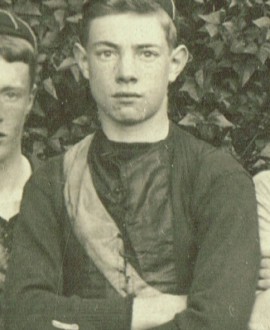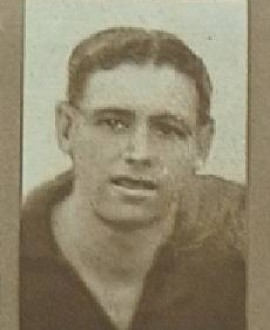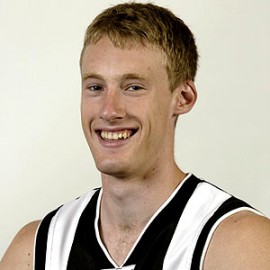

Charles Langtree holds a unique position among the Collingwood Football Club’s war dead. He was the only one to have died while serving in a British uniform.
Langtree was a native-born Australian shaped by his love of the land and his love of sport. But coming from one of the country’s well-to-do families, which included the VFL’s first president, Alex McCracken, Langtree took the option of applying for and gaining a commission in the British Army.
He became a Lieutenant in the Royal Field Artillery and left Australia on June 9, 1915 on the Osterley. While the Australians were then fighting doggedly on the slopes of Gallipoli, Langtree knew he was headed to France – and the Western Front – where the deadly stalemate was even worse than on the peninsula.
Fallen, a book on VFL footballers killed in action, described Langtree as “a big, strapping” man who was “as Australian as a kookaburra cackle.” He was born in Essendon on April 23, 1883, but spent much of his childhood at the family’s rural property, ‘Ulundi’, at Warrenbayne, near Benalla. He attended Haileybury College, where he excelled at both cricket and football, playing in several of the College’s Premiership cricket teams and starring as a ruckman in the football team. He was known at school as the "Quator." He also spent time at Dookie Agricultural College.
Langtree’s time with Collingwood came and went within the blink of an eye - but he could scarcely have timed his short stay any better. The 182cm and 80kg footballer managed only one game, against St Kilda, at the Junction Oval, in Round 12, 1900. But in the week leading up to that game, the Magpies took their players on a mid-winter break to Bright. Country trips were considered a real perk in those days, and Langtree was lucky enough to be included in the touring party. He also played in the game scheduled against the local team, and did well enough to win selection against the Saints when they returned to Melbourne. He was just 17.
Collingwood won the match by 25 points, despite having several of their stars absent. Langtree barely scored a mention in his role at half-forward, and it would prove to be his one and only game of VFL football.
According to Fallen, he “turned his back on VFL football when he decided to stay on the land.” But in the early 1900s he was still playing footy with Brighton, where he continued to win plaudits, and he was part of their 1903 Premiership team in the Metropolitan Association. The Argus described him as "a tall, loosely-built fellow, who should develop into a fine player." "Langtree in the ruck was worth a guinea a box, every time," wrote the Brighton Southern Cross in 1n 1901. "He is hard-working, earnest, and persistent on the ball. His kicking was the best on the ground." "Langtree surprised everyone by putting in some fast runs from the back line," said the same paper two years later. "When fairly started the other side were quite unable to stop him."
After he left Melbourne he spent time as a wool classer in New South Wales as well as gaining experience in other properties on the land. But the onset of the war changed everything for him. He took the option of gaining a commission in the British Army and by the middle of 1915 he had sailed from Australia, intent on making a difference.He sent his sister a cable as he sailed, telling her of his movements and his commission.
Sadly, Langtree would be dead within 14 months of sailing off to war. He was wounded near the French town of Corbie, near Amiens, and died of his wounds on August 3, 1916. He was 33 and it was his sister who received the cable telling of his demise.
His death was announced in newspapers across Victoria only two weeks later. The Benalla Standard recorded that “deep regret is felt in this district where Lieut. Langtree had many friends. Deceased, who was a son of the late Mr C.W. Langtree, acquired the property at Warrenbayne about eight years ago. He was a member of the Benalla Agricultural Society, and was for a time elected to the council of that body.
“He was a good all-round athlete, and for a season or two was a prominent footballer in this district.” The Argus noted that he “played at times with the Collingwood team … and was a well-known footballer.”
The Prahran Telegraph announced soon after that he left “real estate value at 6250 pounds and 20,036 pounds personally to relatives.”
Langtree was, of course, mourned by those who loved him. For his family it was an especially cruel blow, as his oldest sibling, his only brother, had died in 1896, when he was riding his bike home from the MCG and was involved in a fearful collision with a dray.
But even those who had only witnessed Charles Langtree's brief strut upon the Collingwood stage remembered the strapping young lad who played only one game and was gone. And on the day that his death became known in the region, Dookie College flew their flag at half-mast in memory of a life taken too soon – and so far away from home.
- Glenn McFarlane
CFC Career Stats
| Season played | Games | Goals | Finals | Win % |
|---|---|---|---|---|
| 1900 | 1 | 0 | 0 | 100.0% |
CFC Season by Season Stats
| Season | GP | GL | B | K | H | T | D | Guernsey No. | ||
|---|---|---|---|---|---|---|---|---|---|---|




